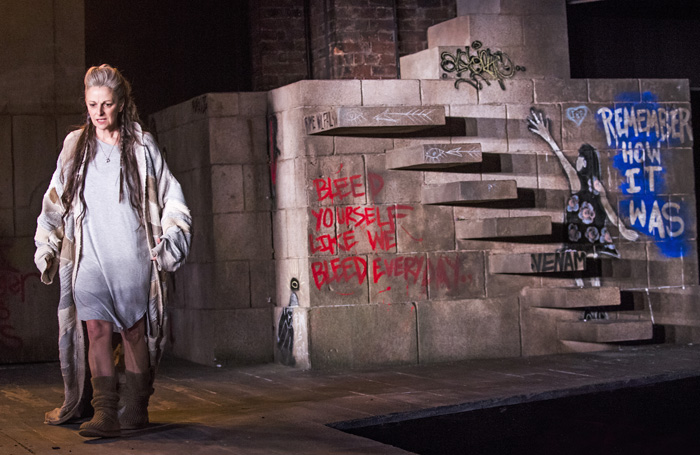CYMBELINE by WILLIAM SHAKESPEARE will transfer to the BARBICAN THEATRE from 31/10- 17/11 performed by the ROYAL SHAKESPEARE COMPANY
The RSC’s 2016 production of Shakespeare’s Cymbeline is a gender-swapping, Brexit-inspired marvel. The Director, Melly Still, breathes new life into this often criticised and under-appreciated play, one which George Bernard Shaw dismissed as “stagey trash of the lowest melodramatic order”.
Cymbeline is the Queen of Britain. She has married a manipulative Duke who has an arrogant son called Cloten. Cymbeline arranges the marriage of her beautiful daughter, Innogen, to Cloten but she defies him and marries the poor but worthy Posthumus Leonatus, a childhood friend. The couple is separated and Posthumus flees to Rome, while later Innogen goes into hiding. Posthumus expects Innogen to stay loyal to him and boasts of her piety, which causes Iachimo, a Roman nobleman, to question him and make a bet that he can tempt Innogen to stray from her husband. Iachimo fails but gains enough “evidence” in order to trick Posthumus into believing that his lover has betrayed him, causing confusion and descent into chaos, with the grips of Rome over Britain ever looming in the background.
The choice of costumes and set design give it a dystopian feel, a sort of post-Brexit wasteland, with designs which show a definite influence from the 1980s punk scene.The scenes in Rome are decked with 1930s decor, tastefully derelict and reminiscent of a gentleman’s club.

Melly Still makes several key gender changes in the play. Clarity is given to the character of Cymbeline (Gillian Bevan), as she gains depth as a mother who is seeking two lost children, as well as a Queen trying to keep her country out of the grips of Rome. Innogen’s wicked stepmother, a tropish figure by this point, becomes the Duke (James Clyde), a cunning force who manipulates Cymbeline as he struggles for power. While Innogen (Bethan Cullinane) and Posthumus (Hiran Abeysekera) remain the same, as a couple tragically separated by class politics, the latter’s servant becomes Pisania (Kelly Williams) and one of Innogen’s lost siblings becomes Guideria (Natalie Simpson).
Bethan Cullinane and Hiran Abeysekera are wonderful as the seemingly star-crossed lovers, both suffering enormously throughout the play with surprising believability. However, particularly, Oliver Johnstone shines as Iachimo. His execution of the temptation of Innogen [link below] is remarkable, at once disturbing and charming. There is also something incredibly touching in the way he begs for forgiveness from Posthumus and Innogen, while drenched in blood and sweat, in the last act.

Although this production was promoted for its individuality as a comment on Brexit, apart from in the pre-show talk and in further reading, its influence did not cross my mind. The production is a strong one on its own, but it is difficult to find a definite message regarding Brexit that runs through the play. However, this production feels fresh and Melly Still has evolved <em>Cymbeline'</em>s flawed plot into one that is engaging and thought-provoking. It ran for 3 hours and I was gripped by every second of it. Please, if you see anything this coming month, make it Cymbeline.
The RSC have generously shared the whole of Act 2 Scene 2 of Cymbeline on their YouTube channel should you wish to get a taste for the production: https://www.youtube.com/watch?v=cIUSksQpefA
You can also see more of Oliver Johnstone in the RSC’s current production of King Lear, in which he plays Edgar.

Cymbeline’s daughter is Imogen … Innogen??
LikeLike
On the programme and the National Theatre website, it says Innogen. I believe the spelling is sometimes different in different editions of the play – Imogen is accepted as the more likely form but Innogen is the one used in this version and a perfectly acceptable option.
LikeLike